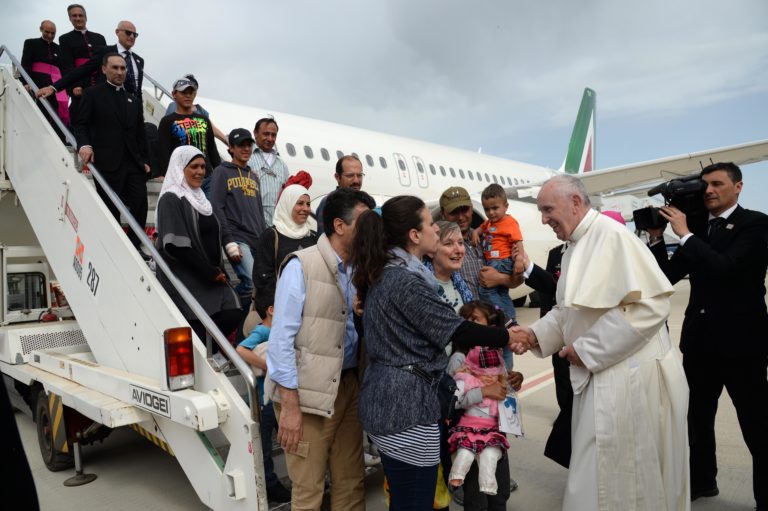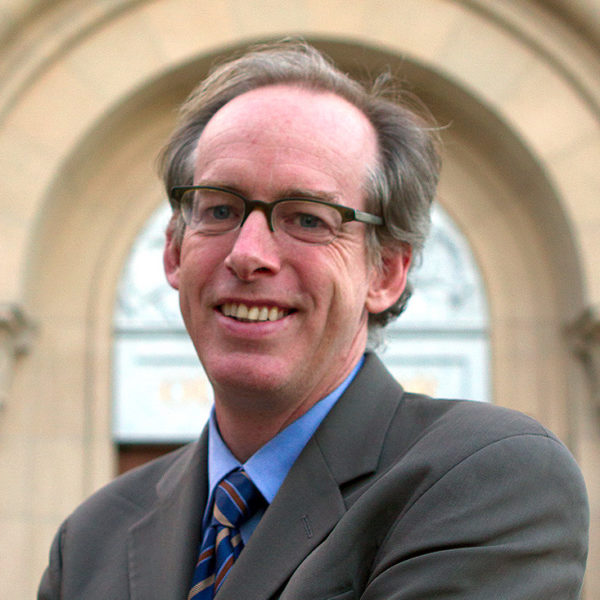
PUBLIC THEOLOGY REIMAGINED Image by Filippo Monteforte/Getty Images.
Pope Francis’ Acts of Accompaniment
When they arrived in Rome, the three Syrian families were taken to the Piazza Santa Maria in Trastevere, and to the old Palazzo Leopardi — now known as the Casa del Rifugio.
There, members of the Community of Sant’Egidio had arranged a Syrian dinner for them: rice with raisins, hummus, roast chicken with Syrian spices, falafel, and stuffed ravioli prepared Middle Eastern style. Together, the families and their hosts sat down to eat — the way people have done together for the Christmas dinners that Sant’Egidio (the progressive Catholic movement based nearby) has hosted in the Basilica of Santa Maria in Trastevere every year since the 1980s.
So ended another extraordinary eight-day week in Pope Francis’s pontificate.
Last Friday (April 8th) the Vatican released Pope Francis’s apostolic exhortation on the family, the outcome of a two-year process involving the world’s bishops, and, to a much lesser degree, Catholics generally. This past Saturday (April 15th) Pope Francis went to Lesbos to visit a refugee camp, and returned with 12 people seeking refuge from strife in Syria on the papal airplane. On his way out of Rome, he exchanged greetings with Democratic presidential candidate Bernie Sanders, who had come to the Casa Santa Marta the day before to speak at a Vatican conference.
This eight-day week, it seems to me, was as significant as Pope Francis’s eight-day trip to the United States last fall.
The juxtaposition of events suggests how fully the pope’s conviction that the Church should “accompany” people on their journeys of faith has found expression in his own acts of accompaniment. It has made people of all sorts wish to accompany him. And it points to a crucial effect of this phenomenon for Americans: namely, that at this moment in a presidential campaign in which the role of religion is seen as greatly diminished, the key religious figure is the pope, of all people.
Truly, the scenario that unfolded in these eight days is stranger than fiction. A Jewish U.S. presidential candidate — an avowed socialist — goes to Rome during a tight Democratic race against the first bona fide female presidential candidate in order to underscore the affinities between his outlook and that of the Argentinian Jesuit pope, who just put out a missive urging Catholic flexibility on family matters. Against all predictions, the candidate encounters the pope in the lobby of the simple guesthouse where the pope lives just minutes before the pope sets out on pilgrimage to a tiny Greek island to join two Orthodox leaders in an act of solidarity with political refugees from Syria and Afghanistan, many of them Muslims.
Stranger than fiction — and yet there’s a telling inner logic to the juxtaposition.
Even before he returned to Rome with 12 refugees, Pope Francis’s trip to Lesbos was a breakthrough moment: the pope going to a “hot zone” of the world just now — putting himself in the center of a humanitarian crisis the way he did in Lampedusa in 2015, in the Central African Republic last November, and in Ciudad Juarez earlier this year.
That he brought 12 people from the camps with him when he returned to Rome was transformative. It suggested that any solution to Europe’s refugee crisis begins with personal acts. Pope Francis didn’t just visit a refugee camp, didn’t just bless people there, didn’t just lunch with them, didn’t just extoll their endurance in tough circumstances: no, he arranged to accompany them back to Rome and help them make new lives there.
All of them are Muslims — and during the presser on the papal plane, a reporter asked the pope why this was so. Pope Francis explained that it was simply that they were 12 people whose papers were in order. But what’s really notable is that the 12 “refugees” were three families, including six children.
To watch the video of their arrival in Trastevere was to realize what the word “refugee” conceals: that many of the people in flight from Syria are members of the Syrian middle class: educated, multilingual, cosmopolitan. Like the people Pope Francis brought to Rome, they are Syrian families who — amidst dictatorship, civil war, and terrorist insurgency — have managed to stick together as families.
Seen that way, Pope Francis trip to Lesbos was a gloss on the apostolic exhortation on families. Here, Pope Francis affirmed, is how the church should address family matters: by accompanying families on their journeys of faith.
The apostolic exhortation — called Amoris Laetitia, or “The Joy of Love” — was much less specific than it could have been. As commentators on all sides have pointed out, it offered no precise way forward on the matter of divorced and remarried Catholics. It had little to say about some specific challenges to traditional Catholic family life in the 21st century, such as same-sex relationships and the domestic arrangements that many Catholics make prior to marriage or after a marriage has failed. The remark — which Pope Francis attributed, in quotation marks, to the council fathers — that same sex unions are not “similar or even remotely analogous to God’s plan for marriage and family” stuck out, because one reason the traditional family is “in crisis,” as Pope Francis put it, is that other domestic arrangements clearly offer many people many of the personal goods, and embody many of the social virtues, that have long been associated with the traditional family: fidelity, stability, companionship, security in times of need, an invitation to a life larger than oneself, and a context in which to discover unanticipated depths of love and commitment.
For all its opacity — for all that it left unsaid, or left for the next generation of Catholic leaders to say — the document was abundantly clear about the church’s role when it comes to families. The church’s way to deal with family matters is to accompany families.
The change in tone and attitude from previous papal documents (and their application in parishes) was such that the document was greeted as a giant step.
Why is this? It’s not just that ordinary Catholics encounter the full variety of family arrangements from day to day and so yearn for counsel and insight. It’s not just that a liberal media, charmed by Pope Francis, is eager to see his every action as a sign of change.
It’s that Pope Francis has shown us again and again what it means for Catholics and the Church to accompany others. You meet people where they are. You presume the good in them and hope that they will presume the good in you. You have a conversation. You open your mind and heart: you prepare to learn something from them. You go where they are going, if only for a little while, trusting that something good will come of it. You keep your wits about you, but you don’t let scruples rule you.
That’s what Pope Francis did in Lesbos. And that’s what he did at the Casa Santa Marta at six o’clock the same morning, when he encountered Bernie Sanders.
Sanders’s trip to Rome was a grand, improbable, last-minute, Hail Mary effort to connect his democratic socialism with Pope Francis’s outlook and popularity, and with Catholic social teaching in advance of the crucial New York and California primaries.
Was it political? For Sanders, of course it was. He is a politician, running for office. For Pope Francis — the pope insisted — the exchange of greetings was not political. It was “common courtesy.”
And it was an act of accompaniment. Although there are many points of concord between Senator Sanders’s program and Pope Francis’s way of spelling out Catholic social teaching, the fit is very far from perfect: compare the Church’s teaching about the sanctity of life with Sanders’ boast in Thursday’s debate with Hillary Clinton that he has a “one-hundred percent” pro-choice voting record in the Senate.
It’s imperfect. But it’s evidently close enough that Pope Francis is willing to accompany Sanders, too, the way he urges church leaders to accompany “imperfect” families — that is to say, all families — on their journeys.
It’s my guess that Pope Francis would have found a way to greet Hillary Clinton, or Ted Cruz, and even Donald Trump, had they sought him out. Apparently they didn’t. Sanders did, and now he has Pope Francis accompanying him.
Will it make a difference? It already has.
